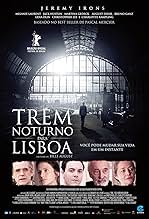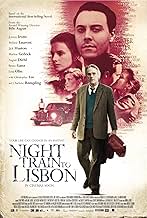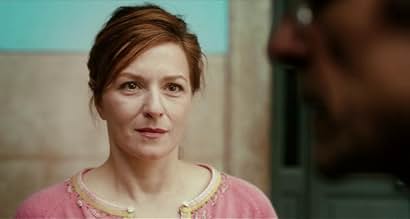Swiss Professor Raimund Gregorius abandons his lectures and buttoned-down life to embark on a thrilling adventure that will take him on a journey to the very heart of himself.Swiss Professor Raimund Gregorius abandons his lectures and buttoned-down life to embark on a thrilling adventure that will take him on a journey to the very heart of himself.Swiss Professor Raimund Gregorius abandons his lectures and buttoned-down life to embark on a thrilling adventure that will take him on a journey to the very heart of himself.
- Director
- Writers
- Stars
- Awards
- 3 wins & 3 nominations total
- Catarina Mendez
- (as Sarah Spale-Bühlmann)
- Director
- Writers
- All cast & crew
- Production, box office & more at IMDbPro
Featured reviews
"Night Train to Lisbon" is a movie with a tedious beginning, when the lead character leaves his students in their classroom and travels to Lisbon in a senseless situation. Then there is serendipity, when he has an accident and breaks his glasses, and the doctor introduces him to her uncle that was a friend of Amadeu. But the development of the plot like a puzzle and the open conclusion are excellent and makes worthwhile watching this movie. The excellent European cast is another great attraction. My vote is seven.
Title (Brazil): "Trem Noturno para Lisboa" ("Night Train to Lisbon")
The film was nominated for six Sophia Awards _ the national film awards of Portugal _ including best picture, and won three, for best supporting actress (Beatrice Bartarda), best art direction and best make-up.
Directed by Bille August ("Pelle the Conqueror"), "Night Train to Lisbon" was adapted from a philosophical novel by Swiss author Pascal Mercier.
Mercier's quotations are spoken in voice-over by the film's protagonist, Raimund Gregorius, played by Oscar winner Jeremy Irons, a quiet, lonely classical studies professor working in Bern, Switzerland, who rescues a young woman about to leap off a bridge and after she disappears, finds himself on a quest to Lisbon, not only to find her but to fully understand the story of a doctor-turned-poet whose book he discovers in the pocket of the coat she leaves behind.
The story isn't as dense or contrived as it sounds, thanks to the deft screenplay by Greg Latter and Ulrich Herrmann, and the uniform commitment to character and plot by Irons and a cast that includes veterans Tom Courtenay, Charlotte Rampling, Christpher Lee and Lena Olin.
It's the kind of story that sucks us in because it's a kind of "getaway" piece: Who doesn't daydream in a Walter Mittyish way of getting away from it all and taking off on an historical detective story, which is what this is.
Once in Portugal, Irons' Gregorius sets about on a quest for the author but instead finds his sister, Adriana (Rampling as the mature version, Batarda as the younger), and learns that Amadeu died in 1974 and that only 100 copies of his book were printed. The sister has six of the books and, wondering what happened to the rest, is delighted to find that her late brother's limited edition work found an audience beyond her country's borders. Thus, a tenuous but all-important bond is formed between the soft-spoken, insightful professor and the poet's sibling.
The movie intersperses Raimund's investigation with flashbacks to a past in which we meet the young Amadeu (a superb Jack Huston), a member of the resistance to the dictatorship of António Salazar.
Through Adriana, Raimund meets the priest (Lee) who taught Amadeu, Amadeu's best friend, Jorge (Bruno Ganz in the older version, August Diehl in the younger), and learns of Estefania (the fiery Mélanie Laurent), a resistance fighter who was Jorge's girlfriend until she met and fell instantly in love with the handsome Amadeu.
After Raimund breaks his spectacles, he meets a sympathetic optician Mariana (Martina Gedeck) who by happenstance has an uncle named Joao (Courtenay as the elder version, Marco D'Almeida as the youthful one) who was also a member of the resistance and fills in the story. Late in the film, the strings of the plot are pulled together when Raimund finally meets the mature Estefania (a stunningly beautiful and completely believable Olin).
As I said, "Night Train to Lisbon" isn't for everyone, especially for those accustomed to tons of action and instant gratification via computer wizardry and slam bang eye-for-an-eye retribution, but it did it for me. It's extraordinarily literate and sumptuously photographed to boot, and it's not a stretch to say it contains threads of David Lean's wonderful 1965 film version of "Doctor Zhivago," albeit on a much smaller scale.
I was especially drawn to Irons' professor, a sensationally muted performance that holds the whole thing together.
Since you'll probably be watching this in your living room, "Night Train to Lisbon" is rated R (under 17 requires accompanying parent or adult guardian) for a scene of violence and brief sexuality (which really aren't all that bad).
A friend says: "Only the people that are alive and have the memory of you can be the true witnesses of your existence on Earth, otherwise - have we been really alive?!...".
You meet people every day in your life, but it is just when you collide with them - voluntarily or not, when they share their life with you and you share yours with them.
I encourage you to take this train. Its worth it! :)
The movie looked exact copy of a novel, like I read some novel. The story telling which transforms the screen constantly between now and 70s were clearly maintained with its destination until the last 10- 20 minutes. Once you know the final conclusion, you may say is that it's because some of you might expect something bigger. But the middle aged or older guys who had experienced life very well will know the meaning of it. Yeah I believe the movie might more suitable for those kinda audience than youngsters.
It was a nice performance by such a great British actor Jeremy Irons. Like I said the story had two diversions, one which set in present time and another in 70s. The present time tale was totally ruled by Jeremy Irons, I liked it more than the 70s tale. The problem with flashback story was its ending, it was very simple especially I expected bit detailed explanation behind character Amadeu's death. And also his failed relationship with Estafania could have been more reasonable. However I am not disappointed with the movie, it was a quite nice drama, in fact awesome. I am not a book fanatic but I love movies based on the novels especially movie like 'Night Train to Lisbon' I won't miss. I say you must go for it if you like the movies which gives more priority to innovative characters than usual theme.
8/10
Did you know
- TriviaThe title of the book written by the character Amadeu "Um Ourives das Palavras" is Portuguese for "A Goldsmith of Words."
- GoofsWhen Raimund is on the Bern Train Station, he is thinking whether he goes on board or not. The train starts to move and the doors are still open, which nowadays it would be impossible in trains of that dimension for security reasons. Although the error was needed to give more tension to the scene, it is still a thing that would never occur nowadays.
- Quotes
Amadeu: We leave something of ourselves behind when we leave a place. We stay there, even though we go away. And there are things in us that we can find again only by going back there. We travel to ourselves when we go to a place. Now we have covered the stretch of our lives, no matter how brief it may have been.
- ConnectionsReferenced in The Salesman (2016)
- SoundtracksLisboa
Composer: Annette Focks
Portugese Guitar: Damiel Pircher
Sound Mixer: Tom Tautorat
Recording & Mix Studio: Emil Berlin Studios
- How long is Night Train to Lisbon?Powered by Alexa
Details
- Release date
- Countries of origin
- Official site
- Languages
- Also known as
- Tren nocturno a Lisboa
- Filming locations
- Production companies
- See more company credits at IMDbPro
Box office
- Budget
- €7,700,000 (estimated)
- Gross worldwide
- $12,020,387
- Runtime
- 1h 51m(111 min)
- Color
- Sound mix
- Aspect ratio
- 1.85 : 1









































